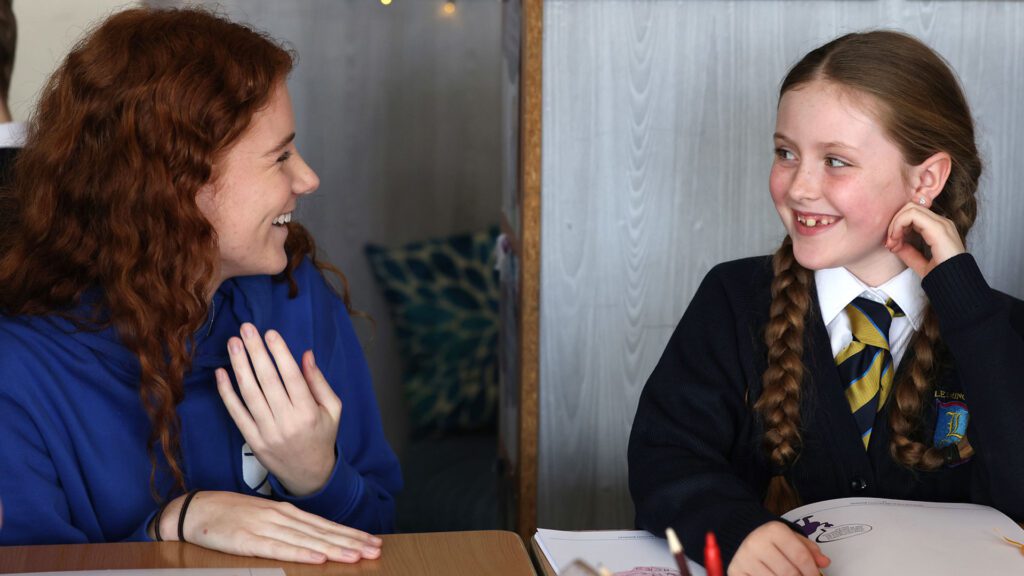Counselling and Psychotherapy BSc (Hons)
UCAS code: B9C8
Gain license to practice as a counsellor on our counselling and psychotherapy degree. Develop your self-awareness and learn ethics and theory before applying your skills in supervised placement practice. Use your new abilities with individuals and groups, in your own private practice or in counselling and psychotherapy organisations.
Overview
| Course length: | 3 years full-time 6 years part-time |
|---|---|
| Start dates: | September 2024 September 2025 |
| Location: | Edge Hill University |
| Example offers: | BCC-BBC (A level) or DMM (BTEC) View full entry criteria |
| Subject(s): | Counselling and Psychotherapy |
| Faculty: | Health, Social Care and Medicine |
| Department: | Allied Health, Social Work and Wellbeing |

Explore how to use counselling and psychotherapy skills ethically and effectively. You’ll improve your confidence and self-awareness on our counselling and psychotherapy degree. All with a focus on helping people to reflect on difficult experiences and to process painful feelings.
There’s also an international angle. You’ll see how communities in other countries perceive mental health. By the end of the programme, you’ll have the personal qualities and therapeutic skills needed for helping others individually and in groups.
At Edge Hill, we invest in your individual emotional development. That’s why you’ll receive £500 in your first year to spend on therapy. You will receive £500 in the second year and another £500 in the third year to spend on your own clinical supervision. Part-time students will receive the equivalent funding over a longer time frame.
Course features
-
International students can apply
-
Professional practice placements
-
Sandwich year option available
What you'll study
Study humanistic psychology, which underpins our approach to human development and therapeutic work with groups and individuals. By learning key professional and academic skills, you’ll enhance your ability to progress through the degree and onto a career in counselling and psychotherapy. And, by exploring the politics of psychotherapy and thinking critically about mental health, you’ll see how this can challenge inequality and help transform lives.
Deepen your counselling and psychotherapy practice and take part in a personal development group, developing your skills and increasing your self-awareness. You’ll be introduced to a range of humanistic approaches to counselling and psychotherapy. You will learn about research and explore how research can enhance practice. You will begin your placement: seeing clients and receiving individual and group supervision to support your work.
Continue your placement and supervised practice. Develop your counselling and psychotherapy skills. Build your identity as a therapist. You’ll gain more experience of group participation and leadership and study the philosophy of mental health to help you think critically. Study international approaches to emotional health and wellbeing, exploring how global issues, like climate change and conflict, impact mental health. You’ll finish the programme by completing a dissertation on a counselling or mental health topic linked to your practice.
Where your course includes optional modules, these are to provide an element of choice within the course curriculum. The availability of optional modules may vary from year to year and will be subject to minimum student numbers being achieved. This means that the availability of specific optional modules cannot be guaranteed. Optional module selection may also be affected by timetabling requirements. Some restrictions on optional module choice or combinations of optional modules may apply.
How you'll study
The programme is initially delivered by tutor-led presentations and class discussions. As the course progresses, the focus shifts to student-led learning, including experiential groups, project work, portfolio building, practice placement activity, student presentations and seminars.
Your lectures will typically take place over three consecutive days per week. Practice sessions may be scheduled for the late afternoon and early evening where counselling skills can be practiced in the quiet environment of breakout rooms to safeguard confidentiality.
You will learn through a varied, inclusive and person-centred approach, reflecting on your own and your peers’ experiences through participation in a personal development group. Your personal development is so important that we will provide an individual budget of £500 to enable you to enrich your learning by accessing your own personal therapy.
An experience of personal therapy provides you with a unique insight into the process of counselling and psychotherapy. Offering you a safe and confidential space in which to explore the depth of your feelings, the personal therapy will enable you to better understand the clients’ perspective and provide an opportunity to enhance your own skills by observing your therapist’s method of working.
How you'll be assessed
You will be assessed through a range of methods, including written assignments, individual and group presentations and skills practice videos.
As the programme progresses, assessments will also include portfolio work, projects, negotiated essay questions and a research dissertation.
There are no formal written examinations as part of the current assessment methods on this programme.
Who will be teaching you
The programme team includes research-active counsellors and psychotherapists with extensive experience in their field, publishing on topics such as climate change, neuro-diversity and adoption issues. Most of our team are experienced therapists.
Programme delivery will be supplemented by associate lecturers including qualified and experienced therapists who will offer insights into working with different client groups.
Entry criteria
Entry requirements
Typical offer 104-112 UCAS Tariff points. No specific subjects are required.
An interview, group work activity and written reflection forms part of the selection process.
Applicants must be able to demonstrate knowledge of humanistic counselling and psychotherapy and the capacity to be reflective and emotionally available.
If you accept a formal offer from Edge Hill University you will be required to apply for a Disclosure and Barring Service (DBS) Enhanced Disclosure indicating that you meet the mandatory criteria of ‘Clearance to Work with Children and/or Vulnerable Adults’. Further information will be sent to you after you have firmly accepted an offer.
Example offers
| Qualification | Requirement |
|---|---|
| A Level | BCC-BBC. |
| BTEC Extended Diploma (or combination of BTEC QCF qualifications) | Distinction, Merit, Merit (DMM). |
| T Level | Overall grade of Merit. |
| International Baccalaureate (IB) | We are happy to accept IB qualifications which achieve the required number of UCAS Tariff points. |
| Access to Higher Education Diploma | 45 credits at Level 3, for example 9 credits at Distinction and 36 credits at Merit or 15 credits at Distinction and 30 credits at Merit. The required total can be attained from various credit combinations. |
Please note, the above examples may differ from actual offers made. A combination of A Level and BTEC awards may also be accepted.
If you have a minimum of two A Levels (or equivalent), there is no maximum number of qualifications that we will accept UCAS points from. This includes additional qualifications such as Extended Project Qualification (EPQ), AS Levels that haven't been continued to A Level, and General Studies AS or A Level awards.
English language requirements
International students require IELTS 6.0, with a score no lower than 5.5 in each individual component, or an equivalent English language qualification.
If your current level of English is half a band, one band, or one-and-a-half bands lower, either overall or in one or two elements, you may want to consider our Pre-Sessional English course.
How to apply
Apply full-time
Read our guide to applying through UCAS to find out more about the application process.
International
Please see our international student pages for further information about how to apply as a prospective international student.
Part-time applications require a direct application to Edge Hill. Please select the year of entry that you wish to apply for.
Should you accept an offer of a place to study with us and formally enrol as a student, you will be subject to the provisions of the regulations, rules, codes, conditions and policies which apply to our students. These are available at www.edgehill.ac.uk/studentterms.
If you join a full time undergraduate degree at Edge Hill University, we will guarantee you the offer of a room in our halls of residence for the first year of your course.
Discover our accommodation
Facilities
The Faculty of Health, Social Care and Medicine offers outstanding facilities for the education and training of health and social care professionals.
The contemporary teaching and learning resources include leading edge clinical skills facilities, an 860-seat lecture theatre, and a variety of teaching rooms and social learning spaces.
Where you'll study
Faculty of Health, Social Care and Medicine
Finance
Tuition fees
UK Full-Time
£9,250
a year
UK Part-Time
£77 per credit
for 360 credits
International
£16,500
a year
EU/EEA and Swiss students who have settled or pre-settled status under the EU Settlement Scheme, as well as Irish nationals, may be eligible for the UK tuition fee rate.
Financial support
Subject to eligibility, UK students joining this course can apply for a Tuition Fee Loan from the Government to cover the full cost of tuition fees. UK students enrolling on the course may also be eligible to apply for additional maintenance loan funding to help with living costs. Please view the relevant Money Matters guide for comprehensive information about the financial support available to eligible UK students, together with details of how to apply for potential funding.
EU/EEA and Swiss students who have settled or pre-settled status under the EU Settlement Scheme may be eligible to apply for financial support. Irish nationals can ordinarily apply to Student Universal Support Ireland (SUSI). If you are an EU student who does not have settled or pre-settled status, or are an international student from a non-EU country, please see our international student finance pages.
Your future career
You could begin a careers as a counsellor or psychotherapist working in counselling organisations or in private practice. You might decide to apply for counselling and support roles in community, residential and education settings. This could include social and probation work, education welfare or drugs and alcohol treatment. Or you may use your new counselling skills in other sectors, such as human resources, international development and management.
Postgraduate study is often essential for developing your career in the counselling sector. Many students go on to study for a Masters degree in counselling and psychotherapy, whilst others seek further training in mental health and nursing.
Our graduates have secured roles that include: counsellor and psychotherapist, mental health co-ordinator for a local authority, and support roles in schools helping and guiding children. Some are pursuing further training for careers in mental health nursing and teaching.
Course changes
Every effort has been made to ensure the accuracy of this information, however our courses are subject to ongoing review and development. Changing circumstances may necessitate alteration to, or the cancellation of, courses.
Changes may be necessary to comply with the requirements of professional bodies, revisions to subject benchmarks statements, to keep courses updated and contemporary, or as a result of student feedback. We reserve the right to make variations if we consider such action to be necessary or in the best interests of students.











